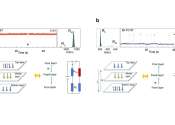In common use, the word noise means any unwanted sound. In both analog and digital electronics, noise is random unwanted perturbation to a wanted signal; it is called noise as a generalisation of the acoustic noise ("static") heard when listening to a weak radio transmission with significant electrical noise. Signal noise is heard as acoustic noise if the signal is converted into sound (e.g., played through a loudspeaker); it manifests as "snow" on a television or video image. High noise levels can block, distort, change or interfere with the meaning of a message in human, animal and electronic communication.
In signal processing or computing it can be considered random unwanted data without meaning; that is, data that is not being used to transmit a signal, but is simply produced as an unwanted by-product of other activities. "Signal-to-noise ratio" is sometimes used to refer to the ratio of useful to irrelevant information in an exchange.
In biology, noise can describe the variability of a measurement around the mean, for example transcriptional noise describes the variability in gene activity between cells in a population.
In many cases, the special case of thermal noise arises, which sets a fundamental lower limit to what can be measured or signaled and is related to basic physical processes described by thermodynamics, some of which are expressible by simple formulae.
In some fields, noise means unwanted information or data that is not relevant to the hypothesis or theory being investigated or tested.









